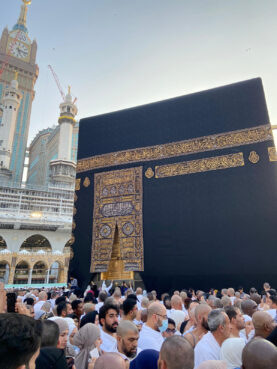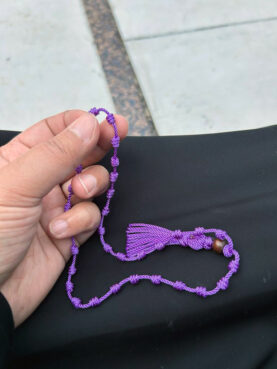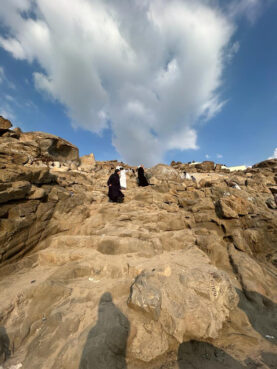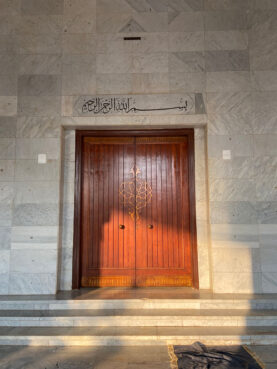(RNS) — The gateway to Mecca for any pilgrim, whether performing Hajj or the less extensive Umrah, as we were, is the miqat, or boundary place. Arriving at the appropriate place — which of the five mawaqeet you go to depends on where you’re coming from — you make your intentions for your pilgrimage. You pray two rakat nafl, put on ihram — for men, two seamless pieces of white cloth, and for women, any full-coverage garment — and also enter into a state of ihram, or purity, for the duration of the pilgrimage.
After leaving Medina, where we’d spent a few days before going to Mecca, we went to Jeddah, where my uncle lives, for a 24-hour pit stop. Then my uncle drove us to the nearest miqat, Al-Jufah, about 90 miles from his home. After entering ihram, we traveled back to Jeddah, picked up our luggage and headed to Mecca.
Arriving in Mecca is a such a rush of anticipation and emotion: This is the city where Islam was born and where so much of the history that we talk about in our homes, in the stories we tell our children, in Sunday or Islamic school, happened. There’s a feeling of coming home to a place where you’re a real part of the ummah — the global Muslim community.
There is also the crush of crowds as you near Masjid al-Haram, the mosque that contains the Kaaba, the house of God and the holiest place in Islam. Amid the throngs, we navigated narrow roads to our hotel, located in the famous Mecca Royal Clock Tower, located beside the Clock Tower Shopping Center — more than 2 million square feet of high-end retail mall.
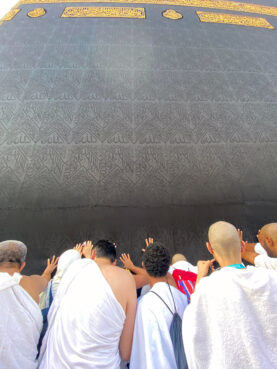
The author’s son, Hamza Ali, lays hands on the Kaaba during his Umrah in Mecca, Saudi Arabia. (Photo by Amal Ali)
In their time in Mecca, Muslims strive to stay in a prayerful state of mind in which worshipping God and centering faith is paramount. But if your hotel is in the Clock Tower, you’re faced with abject consumerism and luxury, a weird and uncomfortable juxtaposition of deen (faith) and dunya (the world).
We checked in, dumped our luggage in our room and immediately departed for the Haram to perform Umrah, because when you come to Mecca for Umrah — especially for the first time — you want to do it immediately. Umrah is actually a set of prayers and rituals, including circling the Kaaba seven times and walking between two hills of Safa and Marwah. At the end your hair is cropped (1 inch for males and females, although Muslims are taught that it’s better for men to shave their head) in a sign that you have finished Umrah and the state of ihram is complete.
I walked my husband and our daughter and son to one of the numerous entrances into the Haram, hugged them, said “Bismillah,” and sent them off. This was as far as I could go. Though I was in ihram, my monthly cycle had started, and I was barred from performing Umrah.
I was grateful that our trip was going off without a hitch, but I admit I struggled with not experiencing my children’s reaction to seeing the Kaaba for the first time and witnessing the prayers they would make. There is something otherworldly about seeing the Kaaba. It is this black and gold structure that all Muslims are praying toward when we say we pray facing Mecca. In our mosques, a niche in the wall, called the mihrab, indicates the direction, or quibla, of the Kaaba.
In the Masjid al-Haram, it is right in front of you. “You know the best part?” I had said to the kids before they left with their father. “When prayer time comes as you’re performing Umrah, you just stop, put your prayer mat down pointing towards the Kaaba and join everyone in prayer. No need to figure out where the qibla is!” Thinking of their expected joy helped me make peace with not being with them.
In the immense courtyard outside the Haram, I looked for a place to sit and worship, along with thousands of other Muslims (until we are hustled to other locations by the numerous caretakers and security guards who are always setting up and taking down barriers for reasons I never figure out). While I waited, I recited verses to myself; read the Quran on my phone; engaged in dhikr, the recitation of phrases from the Quran on my beads, or tasbeeh; and made all the personal prayers to God that friends and family had asked of me.
- Muslim pilgrims perform tawaf, or circumambulate, the Kaaba at Masjid al-Haram in Mecca, Saudi Arabia. (Photo by Amal Ali)
- Dilshad Ali engages in dhikr, the repeated recitation of prayers, using tasbeeh beads, while waiting for her family to complete their Umrah. (Photo by Dilshad Ali)
I thought of my eldest son, who is profoundly autistic, at home with his grandparents and caregivers. When I came to Mecca 20 years before for Hajj after his diagnosis, I was in agony over him. The prayers that were prayed back then — how could I have known what was to come? Grief is a living, breathing entity inexplicably intertwined with joy and contentment. Prayer, I painfully learned over the years, is a gift from God to keep going.
Four hours after they entered al-Haram, my family came out aglow, Umrah complete. My son went to the set of barbers near the Clock Towers and had his head shaved (the last part of Umrah, signaling that it is done) and I cut an inch off my daughter’s hair. They were on a spiritual high (which would later give over to exhaustion), and I was happy to be adjacent to it.
The next few days were a blur. The men in my family battled the inevitable sickness that comes with commingling with thousands upon thousands of Muslims from all around the world. We hired a taxi one day to visit Islamic sites in and around Mecca, including many areas that are part of the Hajj pilgrimage, such as Arafat, where Muslims performing the pilgrimage stand in prayer that is considered the heart of the Hajj.
Numerous times over the years, I had explained to the kids that it is in Arafat during Hajj that Muslims are taught that the angels come down to the lowest level of heaven to record all the prayers being uttered and carry them up to Allah.
When my husband and I performed our Hajj in 2005, we climbed the rocks in Arafat and sat in silent prayer. I felt the presence of something, of angels drawing near, listening. I prayed for everything everyone had asked of me. I prayed my singular, driving prayer for my autistic son, even though my father-in-law gently told me before I had left for Hajj that I should not approach Hajj as a means to somehow “lessen” my son’s autism.
- The Ali family visits Mount Arafat, or Jable Rehmat, where the Prophet Muhammad is believed to have given his last sermon. (Photo by Dilshad Ali)
- The doors of Masjid Nimrah, near the plains of Arafat, where the Prophet Muhammad is believed to have stayed before delivering his last sermon in Arafat. (Photo by Amal Ali)
Now, as we stood in Arafat in non-Hajj times and tried to convey its immense spiritual presence to our daughter, I knew my father-in-law had been right. But I also understood that those prayers uttered years ago and relentlessly since, in various iterations, were being heard.
As we walked back to our taxi, I wondered if I’d be able to perform my Umrah in the one day we had left in Mecca. I wondered at how the millions of Muslims of all ages and abilities find the mental and physical stamina to undergo the challenges of Umrah (and more so Hajj).
I chatted with Bassam Siddique, a pilgrim from Manchester, England, who had come with his extended family, including aged parents, and asked how he was managing. “I think this all comes from Allah,” he said. “Yesterday after we did Umrah, my legs were swollen, my knees in pain. But here I am, ready to continue on. It cannot be explained.”
He asked me if I had done Umrah yet. “My family has, but I have not,” I told him. “Insha’Allah I’ll get my chance before we leave.”
I also spoke with an Australian friend I’d met online years ago in a Muslim autism support group, who had also come for Umrah, along with her husband, son and autistic daughter. We were in the same place at the same time, but when you’re in Mecca, worship is your primary purpose, and so we talked by Instagram DM.
“How did your daughter do?” I asked her, simultaneously envious and in awe that her autistic daughter was able to do Umrah. It was hard, she said, but they managed, adding that “It’s worth it to have her with us.”

Muslim hikers begin the climb of Mount Hira, where the Prophet Muhammad is believed to have received the first revelation of the Quran. (Photo by Dilshad Ali)
Such moments had me second-guessing. Could we have brought along our son? Were we not trying hard enough to include him in this most important journey? But as the rational part of my brain rushed to catch up with my emotions, I knew that the intensity of Umrah and Masjid Haram, the crush of people and the sheer amount of travel would be too hard for him. I still held out hope that someday, although neither Umrah nor Hajj is incumbent upon him due to his disability, he would make it.
Our flight home was Friday evening. In the wee hours of Friday morning, around 3:30 a.m., barely six days after my cycle had started and having monitored myself incessantly, I determined it was done and I performed my ritual bath. The evening before, my husband and daughter had gone to Masjid Ayesha, the closest miqat for repeat Umrah pilgrims to get into ihram, so they could join me in case I’d be able to do my Umrah.
I woke them up at 4 a.m. and announced, “It’s a go!” They got ready, and we left to perform Umrah — their second of the trip, my first. I was battling a 24-hour stomach flu by that point and had picked up whatever bug my husband and son had. The anxiety, anticipation and exhaustion had stubbornly caught up with me. But nothing was going to stop me. After nearly 20 years, I laid eyes on the Kaaba and felt immense contentment and relief.
Six exhausting hours later, my Umrah was complete. I had left it all on the field. Nine hours later, we boarded our plane for our trip home to be reunited with our son.
(Dilshad D. Ali is a freelance journalist. The views expressed in this commentary do not necessarily reflect those of Religion News Service.)





